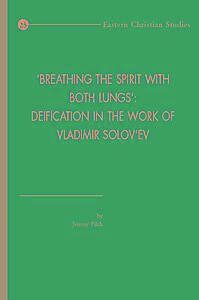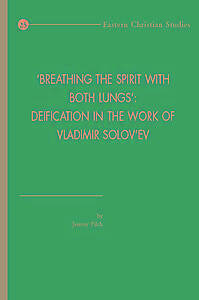
- Retrait gratuit dans votre magasin Club
- 7.000.000 titres dans notre catalogue
- Payer en toute sécurité
- Toujours un magasin près de chez vous
- Retrait gratuit dans votre magasin Club
- 7.000.0000 titres dans notre catalogue
- Payer en toute sécurité
- Toujours un magasin près de chez vous
78,00 €
+ 156 points
Description
This book is an examination of the teaching of the Russian religious thinker Vladimir Solov'ev (1853-1900) about divine-humanity, the term he used to express the patristic doctrine of deification. The first chapter examines the theme of deification in the patristic tradition and shows that he himself was extremely familiar with the writings of the Church Fathers and the doctrinal teachings of the early Church Councils. The following three chapters are devoted to specific works of Solov'ev which are analysed in detail, Lectures on Divine Humanity, The Spiritual Foundations of Life and The Justification of the Good. Of these, the latter two have, to date, received little extended scholarly study. The over-arching thrust of this work is that Solov'ev's concept of deification started as a reflection of the mystical and cosmic expressions of deification characteristic of the late Greek patristic period but develops so to be expressed in the western terminology of grace and focuses on the active implementation of deification in the world, taking the teaching out of its original monastic context. Chapter Two reveals the significant impact of Maximus the Confessor on Solov'ev's thought and identifies the dyothelite Christological model which Maximus develops from the dogmatic definition of the Council of Chalcedon as crucial hermeneutical principle in Solov'ev's thought. Chapter Three shows the development of Solov'ev's teaching about deification, examining how it expands to embrace different models of deification, adopting western as well as eastern theological approaches and finding its centre in the life of the Church. Finally, Chapter Four shows how Solov'ev's deepening understanding of the western approach to deification through the language of grace is combined with an eastern understanding of human anthropology, enabling him to integrate realistic and moral approaches to deification, and address the whole range of human experience in terms of divine union and the Kingdom of God.
Spécifications
Parties prenantes
- Auteur(s) :
- Editeur:
Contenu
- Nombre de pages :
- 249
- Langue:
- Anglais
- Collection :
- Tome:
- n° 25
Caractéristiques
- EAN:
- 9789042934252
- Date de parution :
- 01-04-18
- Format:
- Livre broché
- Format numérique:
- Trade paperback (VS)
- Dimensions :
- 160 mm x 239 mm
- Poids :
- 340 g

Les avis
Nous publions uniquement les avis qui respectent les conditions requises. Consultez nos conditions pour les avis.






